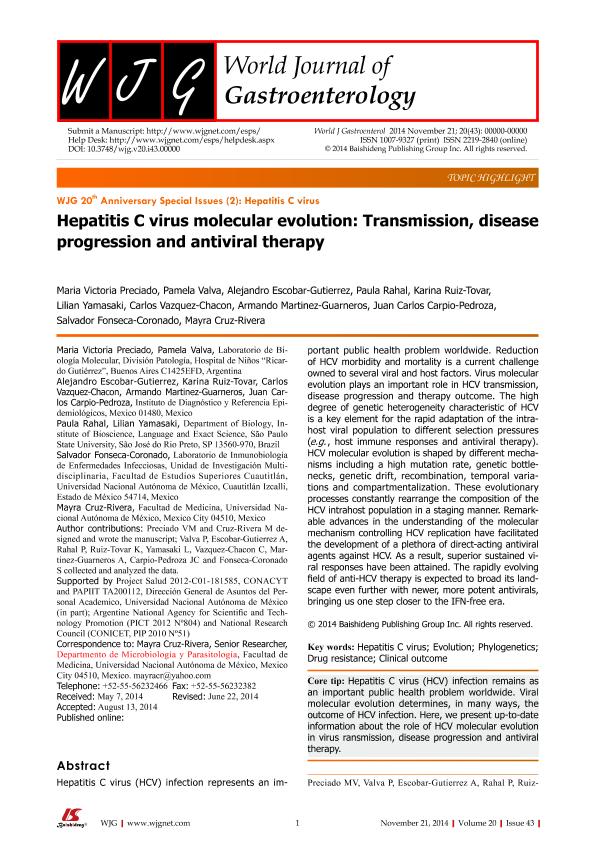Artículo
Hepatitis C virus molecular evolution: Transmission, disease progression and antiviral therapy
Preciado, María Victoria ; Valva, Pamela
; Valva, Pamela ; Escobar Gutierrez, Alejandro; Rahal, Paula
; Escobar Gutierrez, Alejandro; Rahal, Paula ; Ruiz Tovar, Karina; Yamasaki, Lilian; Vazquez Chacon, Carlos; Martinez Guarneros, Armando; Carpio Pedroza, Juan Carlos; Fonseca Coronado, Salvador; Cruz Rivera, Mayra
; Ruiz Tovar, Karina; Yamasaki, Lilian; Vazquez Chacon, Carlos; Martinez Guarneros, Armando; Carpio Pedroza, Juan Carlos; Fonseca Coronado, Salvador; Cruz Rivera, Mayra
 ; Valva, Pamela
; Valva, Pamela ; Escobar Gutierrez, Alejandro; Rahal, Paula
; Escobar Gutierrez, Alejandro; Rahal, Paula ; Ruiz Tovar, Karina; Yamasaki, Lilian; Vazquez Chacon, Carlos; Martinez Guarneros, Armando; Carpio Pedroza, Juan Carlos; Fonseca Coronado, Salvador; Cruz Rivera, Mayra
; Ruiz Tovar, Karina; Yamasaki, Lilian; Vazquez Chacon, Carlos; Martinez Guarneros, Armando; Carpio Pedroza, Juan Carlos; Fonseca Coronado, Salvador; Cruz Rivera, Mayra
Fecha de publicación:
11/2014
Editorial:
Baishideng Publishing Group
Revista:
World Journal of Gastroenterology
ISSN:
1007-9327
e-ISSN:
2219-2840
Idioma:
Inglés
Tipo de recurso:
Artículo publicado
Clasificación temática:
Resumen
Hepatitis C virus (HCV) infection represents an important public health problem worldwide. Reduction of HCV morbidity and mortality is a current challenge owned to several viral and host factors. Virus molecular evolution plays an important role in HCV transmission, disease progression and therapy outcome. The high degree of genetic heterogeneity characteristic of HCV is a key element for the rapid adaptation of the intrahost viral population to different selection pressures (e.g., host immune responses and antiviral therapy). HCV molecular evolution is shaped by different mechanisms including a high mutation rate, genetic bottlenecks, genetic drift, recombination, temporal variations and compartmentalization. These evolutionary processes constantly rearrange the composition of the HCV intrahost population in a staging manner. Remarkable advances in the understanding of the molecular mechanism controlling HCV replication have facilitated the development of a plethora of direct-acting antiviral agents against HCV. As a result, superior sustained viral responses have been attained. The rapidly evolving field of anti-HCV therapy is expected to broad its landscape even further with newer, more potent antivirals, bringing us one step closer to the interferon-free era.
Palabras clave:
Hepatitis C Virus
,
Direct-Acting Antiviral Agents
,
Disease Progression
Archivos asociados
Licencia
Identificadores
Colecciones
Articulos(SEDE CENTRAL)
Articulos de SEDE CENTRAL
Articulos de SEDE CENTRAL
Citación
Preciado, María Victoria; Valva, Pamela; Escobar Gutierrez, Alejandro; Rahal, Paula; Ruiz Tovar, Karina; et al.; Hepatitis C virus molecular evolution: Transmission, disease progression and antiviral therapy; Baishideng Publishing Group; World Journal of Gastroenterology; 20; 43; 11-2014; 15992-16013
Compartir
Altmétricas



